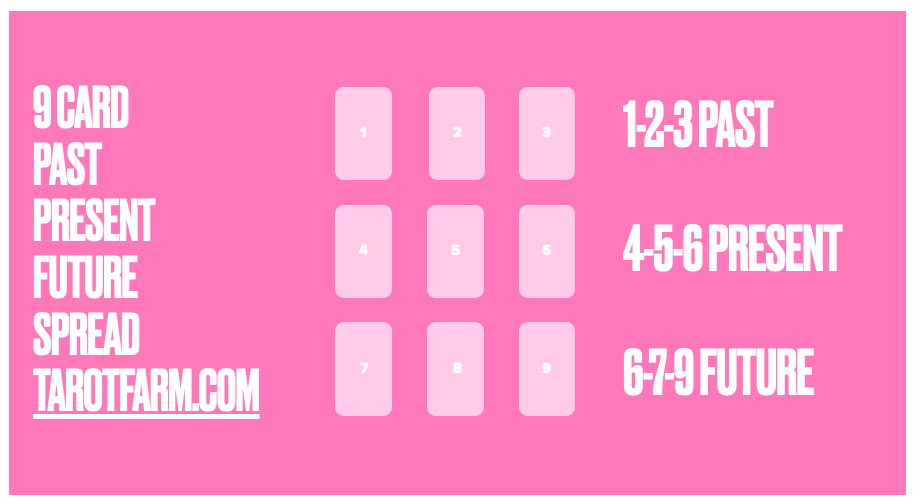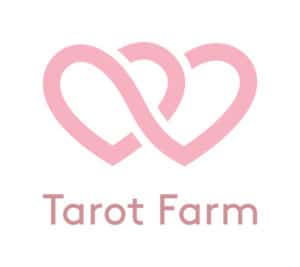Asking the tarot cards about your past, present, and future is a great way to get started with tarot readings. This tutorial will show you how to do a past, present, and future tarot reading in 10 simple steps.
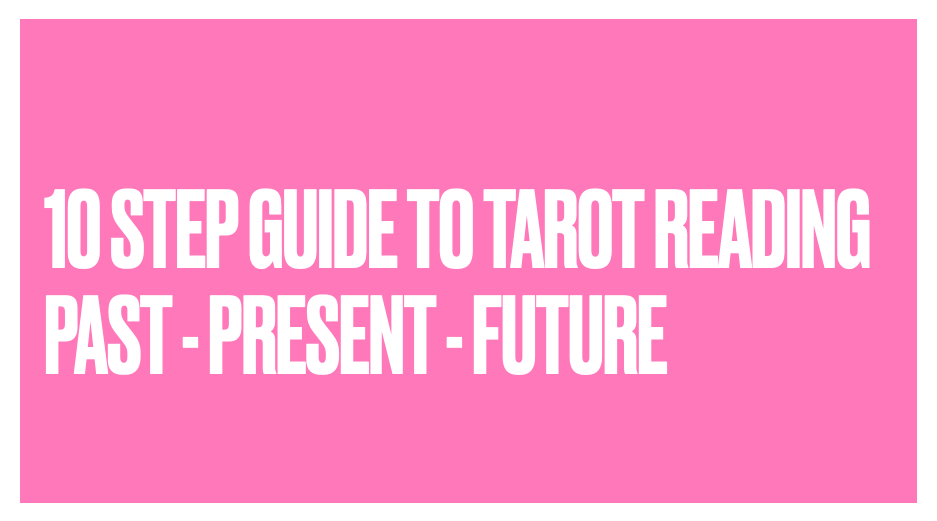
At the beginning of our tarot learning journeys, it feels as if information masses are flowing through us. Especially then, we need as many understandable tangibles to hang on to. Observing your history, current position, and the direction you want to go to are relatable perspectives to everyone walking on planet earth. Therefore, inquiring about your past, present, and future is a great starting point for all tarot beginners. It is the perfect tarot spread to start itching your intuition and seeing what the tarot cards can tell you.
Here is a step by step walkthrough on how you can start pulling the cards for yourself. I’ve also included an example-reading to go with the steps. So let’s go!
What do you need to do a Tarot card reading?
Before we get into the steps, let’s go through the things you will need for a tarot reading.
- A tarot deck
- The little white booklet for tarot card meanings or a tarot card cheat sheet
- Preferably a table in a calm and relaxing place
- Open mind
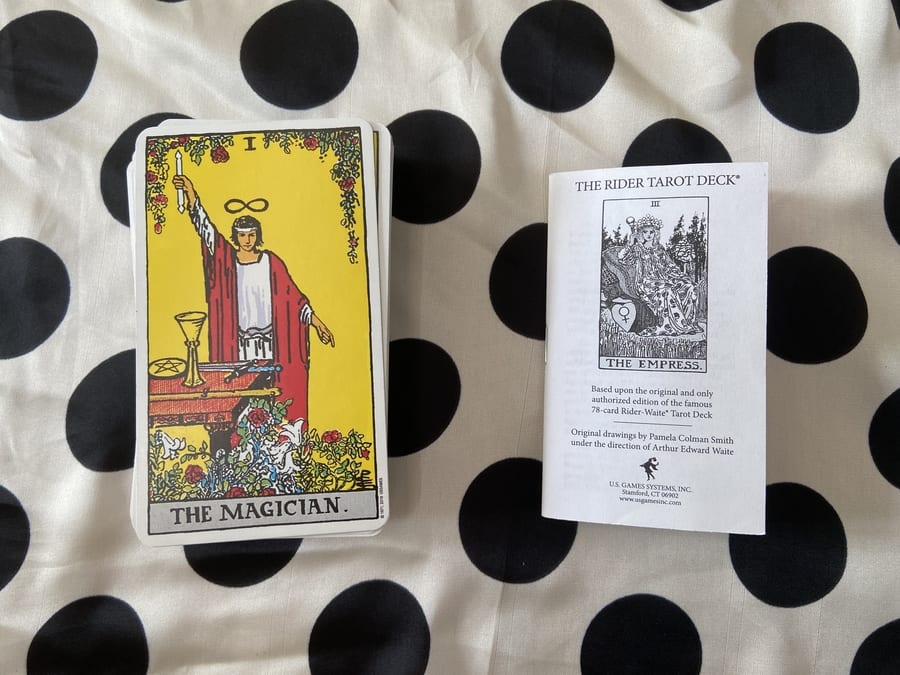
Now that we got everything in place, let’s get to it!
How to do a past, present, future tarot reading?
Step 1 – Know the basics of tarot.
In case you are not yet familiar with the concept of tarot readings, let’s quickly summarize it. It is a narrative where a tarot reader tells a story through tarot cards to a seeker looking for answers. The seeker is also known as the querent, “one who seeks,” and the tarot reader is called the interpreter. To tell the story, the reader uses the tarot cards in combination with a tarot spread to interpret the tarot’s message.
The Tarot Cards are a deck of 78 cards, which all have unique meanings. Before you start practicing tarot readings, it is good to familiarize yourself with the tarot deck. You don’t need to know each card by heart, it is not essential, but it is good to be familiar with Major and Minor arcana concepts. Your intuition will be the most essential tool when you start doing tarot card readings.
The tarot deck consists of two parts: the 22 card major arcana and the 56 card minor arcana.
- The major arcana depicts the Fool’s journey through life’s significant events, lessons, and realizations. Each card represents one of these lessons.
- The minor arcana depicts the more daily situations through four suites called Cups, Pentacles, Swords, and the Wands. Cups are related to emotional matters. Pentacles are about work and finance-related issues. Swords are about thoughts, words, and actions, and Wands about ideas and spirituality.
The tarot spread is a pattern for the tarot cards where they are physically laid out. The positions on the spread can have meanings as well. In this tutorial, the spread will have three positions that have meanings; the past, the present, and the future. In a way, the tarot spread sets a framework for a tarot reading and the tarot cards – its details. There are numerous tarot spreads to choose from, and it is the card reader who ultimately decides which spread they will use.
Example reading – Step 1: On each step, I will be writing my own action on that particular step. I hope this adds a bit of flesh around the bones and makes the steps more concrete. Anyhow, now that we are ready with the basics, I suppose you have a tarot deck with you and an open mind to allow your intuition flow. Let’s go to step 2.
Step 2 – Find a quiet space to do a reading.
Because you are putting your intuition to work, you will want to be in a place where you can concentrate on the present and be uninterrupted. Letting your intuition flow requires a tranquil place where you can feel relaxed. Feel free to choose wherever you feel comfortable. It can be either indoors or outdoors; the main thing is that it is somewhere quiet, relaxing, and peaceful.
Example reading – Step 2: My reading spot today is at our dining table, where I read most of the time. I just love how the light hits this area of the apartment. It also has a sliding door to the terrace, which allows me to breathe the fresh outside air and hear the birds outside.
Step 3 – Ground yourself and the possible seeker to the present moment
The main point of this step is to get you and the seeker concentrated in the present moment.
If you are reading for yourself:
When you are reading for yourself, you can just take a moment to breathe and concentrate on the present. You can set the mood in many ways by lighting candles, smoking incenses, and playing relaxing music in the background that helps you focus.
If you are reading for someone:
Before each reading, it is good to have a moment to connect personally with the querent. It helps to feel relaxed and know something about what the seeker is looking for and why.
Every reader has their pre-reading rituals and ways to break the ice with the seeker. I personally like to go through the expectation of the reading with the seeker and clear some of the misconceptions of the tarot.
Therefore I at least ask:
- What are their experiences with the tarot?
- What are they expecting from the reading?
Then I also tell how I approach tarot readings:
- I always tell that tarot is not a fortune-telling tool. Even though here we are looking at the past, the present, and the future, we are not performing magic.
- The purpose of the reading is to offer different perspectives on life’s difficult situation and question.
- Tarot works as a catalyst to our intuition to help us make sense of our needs. And what we need to do for the things that we desire to happen.
Of course, most of this is done through small talk, and it comes out naturally through conversation. It is an excellent way to break the ice, and you will improve in this the more experience you get. If you are reading for a friend in the beginning, it will be much easier.
Example reading – Step 3: I am reading for myself today, so I am now starting to focus on the task. I like to smoke some incense and spread some crystals around my space to set me in the mood. Then I start pointing my thoughts to the next step.
Step 4 – Think of the intention or the question.
You can do this step simultaneously with step number 5 – shuffling the deck, but let’s go over this step first to make sense of the process. Here we ask the seeker, or ourselves, to transfer their thoughts to the intention or questions they seek answers for and reveal it to the reader.
As we covered in the previous step, A tarot is a great tool to make sense of the choices we need to make. It helps us understand what we really need, and therefore, it can give us confidence in our choices. An essential point is to ask the tarot the right type of questions to gain this type of clarity.
To make meaningful questions or help the seeker ask helpful questions from the tarot, here are some things to think about:
- Keep the questions open – Questions that result in a yes and no answer don’t offer as much value to the seeker as questions that allow for some details.
- Keep the questions on the subject that the seeker has influence over – Asking questions about things or someone that we have no power over will not be beneficial for the seeker.
- Keep the questions focused on the present – We cannot change the past, so there is no point in focusing the questions there. Keep the questions in the present but learn from the past. And concentrate on the actions to take, so that the future will be as desired.
Here are some sample questions for a tarot reading about the Past, Present, and Future:
- About Love:
- What can I do to increase my chances of love?
- How can I improve my connection with my partner?
- What is preventing me from finding love?
- About Money:
- What is preventing me from achieving financial success?
- What are my attitudes about material things in life?
- How should I change my spending behavior?
- About Career:
- What can I do to improve my career?
- What are my strengths and weaknesses in the job market?
- What is preventing me from advancing in my career?
Example reading – Step 4: Today… think think think, I want to ask the tarot how can I strengthen the bond between myself and my partner? I am traveling tomorrow, and I will be separated from my husband for almost three weeks. I am excited to go on this trip, but it is a long time, and I know that I will be missing him, so it always makes me feel a bit uncertain if taking such a long trip is a good idea or not. Besides, it is nice to know a little more about love, so this is the question I am going with today.
Step 5 – Shuffle the deck.
Shuffling the deck is an essential part of the process, so never forget to do that. You will want the cards to be in a random order for the tarot to work its “divine magic.” (I know, I said earlier we are not performing magic, but you got to mix the deck, ok.)
Shuffling tarot cards is not always as easy as mixing a deck of playing cards, as some deck can be quite large. And, especially if you have small hands, it might be difficult to shuffle the cards with the traditional means. Just remember there is no one correct way to mix, so it will be up to you to decide how you will do it.
You can shuffle as long as you feel like it. The main point is to randomize the cards from the previous order. Here are some methods you can try:
- Overhand shuffle: Hold the deck in either one of your two hands and use your free hand to shuffle the deck by lifting little glumps of the deck over the other part. You will need to repeat this many times to have an adequately mixed deck.
- Cut the deck: Place the deck in front of you and cut it to several smaller decks. Then bring them back together and repeat. To get them properly mixed, you will need to do this quite many times.
- Smushing: In this method, you mix your deck into a messy pile of cards and continue mixing for at least a minute. After a minute, the tarot deck will be in very random order.
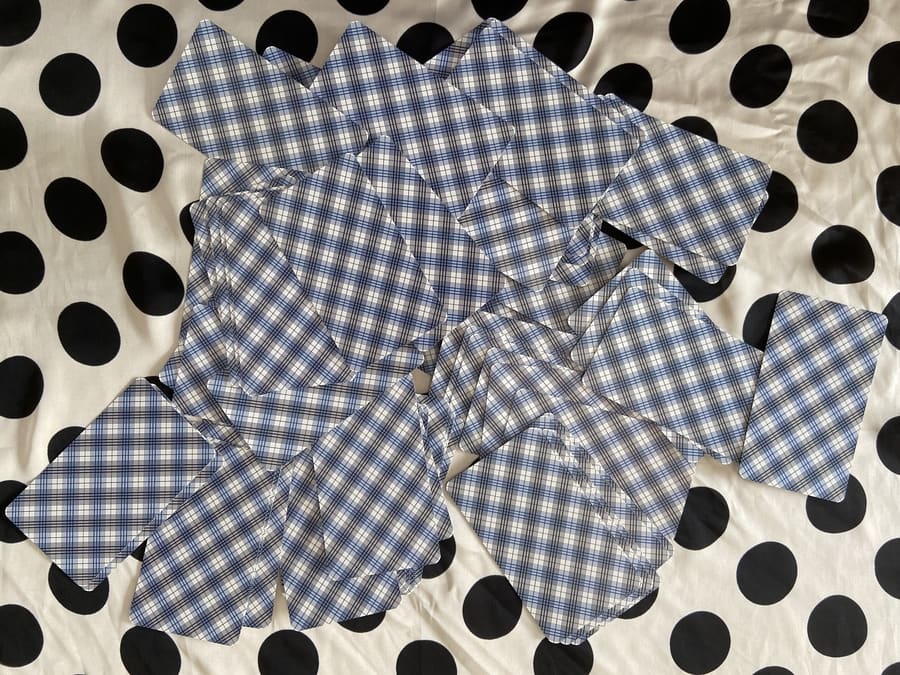
A downside to the first two techniques is that they aren’t effective in creating randomness. Smushing is more effective in this. It is actually a technique that many casino dealers use to shuffle the playing card decks, so you know that it is effective.
A downside to smushing for beginner readers is that it also allows the cards to go upside down. These are called reversal cards, and they have their own meanings. If you are not ready to read them, you can turn them upright in the next step.
Extra tip! One great way to enhance the seeker’s reading experience is to let them shuffle the cards and finally cut the deck. This is entirely optional, but I think it is a great way to let the seeker get involved and let them transmit their energies to the deck.
Example reading – Step 5: Oh, I am smushing and smushing away… It is worth mentioning that it is good to gather the deck a few times between when you are doing this. Also, make sure you are not only mixing the middle part of the deck. Get the whole deck involved in the smushing.
Step 6 – Deal the cards to a 3 card tarot spread – past, present, future.
Now, we are getting somewhere. It’s starting to look like a tarot reading. In this step, you will lay the cards in the formation that we call a tarot spread.
Now you might be thinking which way I should face the cards if I am reading for others?
The answer is either way, but decide which side is up before you deal the cards. One thing to consider is that if you are just getting started with tarot, you will need to look at the card imagery far more closely than a reader who knows the cards by heart. Therefore it is easier to face the cards towards you to make the reading easier. So let’s stick with that for now.
Let’s start with a straightforward 3 card – past, present, and future tarot spread. You can let the seeker choose three random cards from the deck or lay three of the top cards between you and the seeker.
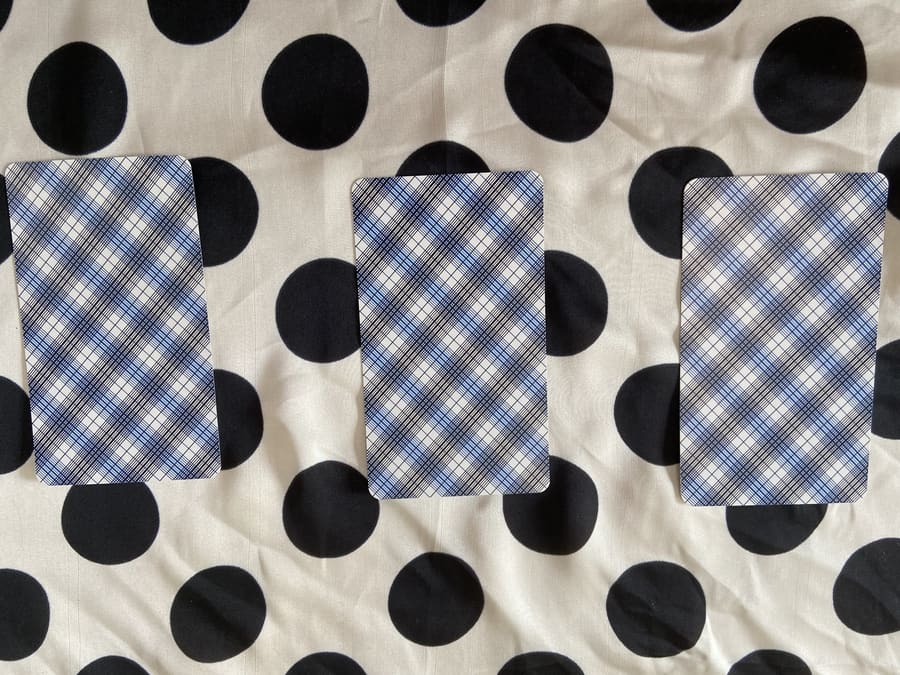
- The card on the left represents the past
- The card in the middle represents the present
- The card on the right represents the future
Remember that the spread gives a structure for the story that you will be soon interpreting from the tarot cards.
NOTICE: I have added more example spreads underneath this tutorial to modify this step as you develop. There are sample spreads for 4 cards, 6 cards, and 9 cards.
Example reading – Step 6: I laid out three cards in front of me. I am keeping in mind what I asked in the previous step, and I will be looking at the spread in that context in the following steps.
Step 7 – Flip the tarot cards.
This step seems obvious, but this is one of the few things in tarot, in my opinion, where there is a right and wrong way of doing it.
Especially if you want to include reversal cards into your reading, flip tarot cards from the side!
If you flip them from the bottom up, the cards intended reversed become upright and vice versa. It will interfere with how the tarot intended the cards to be. If you don’t want to read reversed cards, it is entirely ok to just turn them upright.
Example reading – Step 7: Here is the spread that showed up for me.
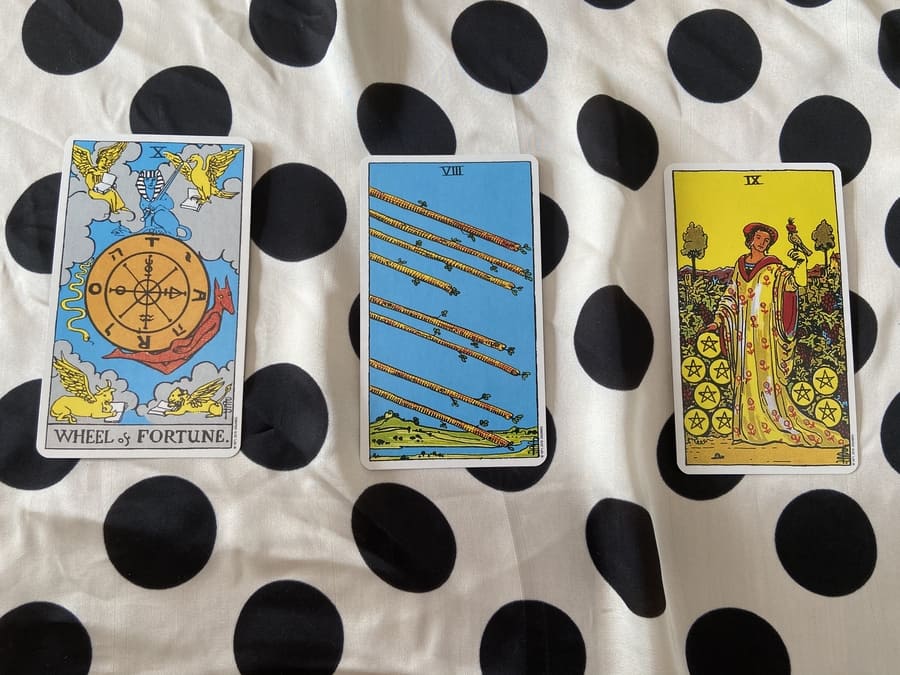
Step 8. – Examine the cards and look for common clues.
When the cards are revealed, it’s time to examine them. This is the fun and exciting part where you already let your intuition flow a bit. Tarot cards hold numerous clues to their meanings in the card imagery. Let them give you hints for the card meanings and what they could mean in this reading context.
You can look for them in the form of:
- Numbers
- Symbols
- Colors
- Facial expressions
- Characters
- interactions and
- Other elements that set the mood in each card
When looking for these clues, keep in mind what each position in the spread represents and the seeker’s question.
- The card on the left is representing the past, so this could be:
- The people, energies, and experiences from the past are affecting the situation
- Learnings from the past can help the seeker with the problem today
- Events from the past that are holding you back on the issue at hand
- The card in the middle is representing the present, so this could be:
- The current energy of the issue at hand
- What the seeker should realize about the issue at this moment
- Challenges of the present moment
- The card on the right is representing the future, so it could be showing:
- In which direction are things moving
- The outcome of the issue at hand
- What is it that the seeker truly desires from the situation
Example reading – Step 8: Let’s have a look…
Past: The first card is the Wheel of Fortune. It is one of the Major Arcana cards, and it is numbered ten, which puts it in the middle of the journey of the Fool. As it is a major arcana card, it is a sign that this is something significant I need to realize from my past that has to do with the situation.
On the card imagery, several different creatures are going around the wheel that continually moves. Together they are giving me the feeling that this card represents constant change of good and bad times.
All in all, this card is giving me positive vibes. Somehow I feel that this is pointing to learning about change and transformation from the past.
Present: Eight of Wands – This card has eight wands pointing downward to the right where there is a green field. The sky in the background is clear and blue. It looks as if the wands were flying in the air.
The card is a minor arcana card, so it’s more about our lives’ everyday events. I know that 8 in the tarot means action and accomplishment, and Wands are also about inspiration and enthusiasm. It is giving me very positive vibes about whatever is going on in the present.
Future: Nine of Pentacles – There is a pleased lady in the middle of nine gold coins. She seems to be independent and enjoying some private time as well. It is also a minor arcana card, so it is passing energy. 9 in tarot means fulfillment, and pentacles care about materialistic things in life. Hmmm. What is this all leading to….?
Step 9. – Combine and Interpret the reading.
In this step, we combine everything we know and let our ultimate tool for tarot readings free – our intuition.
Don’t worry if this step feels hard at first because most certainly, it will. This is why we need to practice this again and again. Just don’t take it too seriously, and it will be a lot of fun! I promise you.
This is also when you can consult the little white booklet that usually comes with the tarot deck. It will most certainly be useful in this stage. You can also print one of the several cheat sheets available online to peek at the card meanings.
But let’s get to it. As I said here in this stage, we are combining everything we know:
- The question of the seeker
- The positions in the tarot spread – past, present, future
- The card meanings
Now that we have all together, we are ready for the grand finale to complete the reading.
Example reading – Step 9: I am reading our “example reading” something like this:
Past: Wheel of Fortune is about unexpected events and progress. We have gone through some challenging times together, but now, better times have replaced them. The wheel has turned. We have grown stronger together from the experiences we have had. I read this that we need to appreciate the progress we have made and appreciate where we are now.
Present: The Eight of Wands is representing the energy of the present or the steps that we can take now to realize future events. I am getting a traveling vibe from this card as the wands are flying through the sky. It is about action and enthusiasm. I don’t know if it has to do with the fact that I happen to be traveling tomorrow away from my husband. I am super excited to go do wine harvesting to the French countryside and learn French simultaneously. I read this that this is depicting the enthusiasm of the trip at hand.
Future: I see an independent woman having a good time on the Nine of Pentacles. I am reading this that I will enjoy staying and working in France, and it will do good for our relationship. The pentacles are about worldly things, so maybe this time will be productive for our future. I am working a bit and getting paid, and my husband can concentrate better on his work.
Step 10. Write about it in your Tarot journal – (optional)
An excellent way to contemplate your progress as a tarot reader is to write each reading down in a tarot journal. Later on, you can check whether you made the choices according to the reading and how spot on your intuition was.
Example reading – Step 10: I wrote some thoughts down about this reading, and I have to say that I am feeling a bit amused at how positive and spot on this reading went. The reading made me feel better and more optimistic about the trip and how it affects our relationship. I think this example illustrates what tarot reading is about. It brings clarity to what we want and gives us the confidence to make the choices we need to make.
I hope you enjoyed this tutorial. Below you will find some extra past-present-future spreads for you to practice on. They are simple, but they add some depth into the three-card spread.
4 card Tarot spreads – Past, Present, Future
This is a fun approach to add some extra depth to the reading. Add an extra card that will guide you where you should focus on reaching the desired outcome.
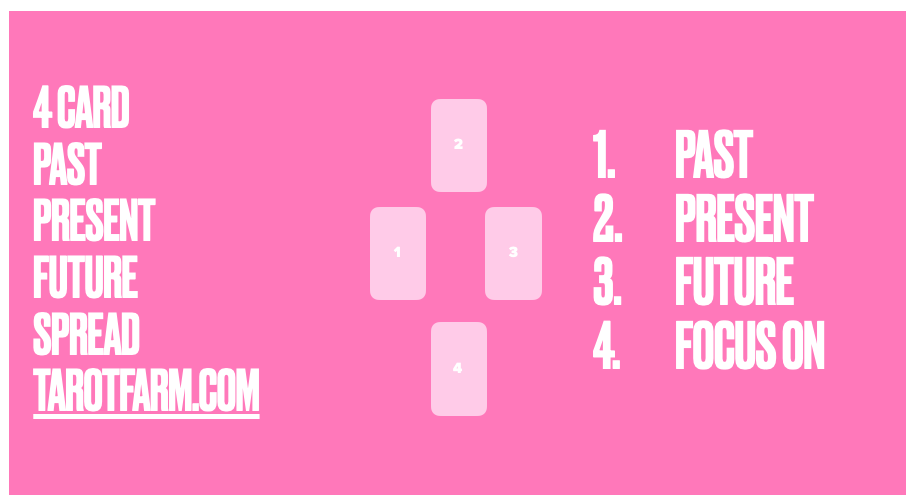
5 card Tarot spreads – Past, Present, Future
On this spread, you add once again another layer to your previous spread. The fifth card will represent the things that are distractions for the desired outcome. The querent should avoid focusing on the energy of this card.
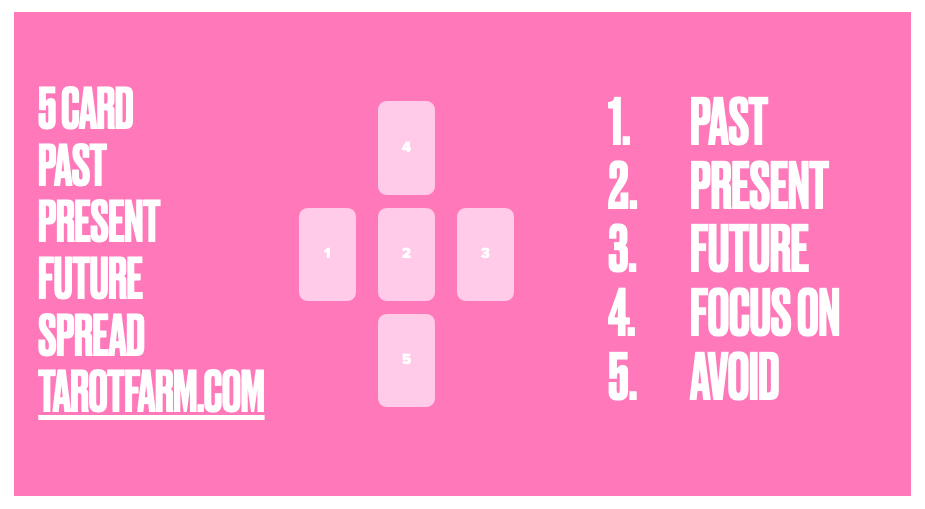
9 card past, present, future tarot spread
If you want some challenge into your past-present-future readings, you can add some cards to each of the three phases. On this spread, the 1st, 2nd, and 3rd cards represent the past. 4th, 5th, and 6th cards represent the present. 7th, 8th, and 9th represent the future.
